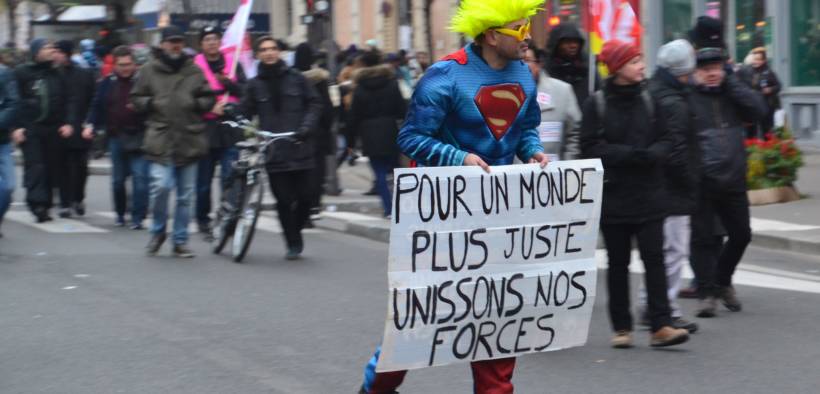Macron Retreats On Pension Reform In The Face Of Unrelenting Protest

French protesters scored a major victory over the weekend when French President Emmanuel Macron scaled back one of his planned pension reforms, but not all are happy.
The French government announced a major concession in its fight with unions over the country’s pension system after five weeks of massive protests that have caused widespread disruption in the country.
President Emmanuel Macron’s original pension plan would have replaced the current system, which has 42 different pension plans for workers in the private and public sectors, with a universal points-based system. The proposal would have raised the age to receive a pension from 62 to 64, making millions of people work longer or receive lower payments.
On Saturday, Macron’s government announced it would withdraw the age limit proposals and delay decisions about other changes until April.
Protests Sweep France
Macron’s concession comes in the face of nationwide protests, with more than 800,000 people demonstrating against Macron’s pension plans last month in France’s largest strike in decades. The ongoing demonstrations have broadly disrupted the country’s transportation services, with striking oil workers blocking oil refineries, firefighters hosing government buildings, and electrical workers providing discounted power to poor communities while shutting off electricity at government and corporate buildings.
The French are fighting over a pension system that has helped the country achieve one of the lowest old-age poverty rates in the world. Only 5 percent of French seniors live in poverty, a rate that is nearly four times higher in the U.S.
Some unions hailed the concession as a success, but other protesters remained skeptical about the French government’s true intentions.
“We’ve got to continue to mobilize, until they pull the whole plan, pure and simple,” said Eric Coquerel, a representative in Parliament with France Unbowed party.
“Far from a real compromise, this amounts to nothing more than an act of political theater aimed at presenting the government as open to negotiation and compromise (while luring the union leadership into the trap of a “passive revolution”), thereby preparing to depict the workers as stubborn, irrational and anti-democratic if they do not stop the strike,” wrote philosopher Gabriel Rockhill. “Moreover, when one reads between the lines of Philippe’s proposal, it becomes increasingly clear that it would change almost nothing in regard to the original plan.”
France’s Civil Society
France’s current protests follow a series of successful mobilizations that supporters say provide an example of how popular movements can successfully confront corporate and state power.
“In 1995, it only took three weeks for a massive strike to force Prime Minister Alain Juppé to curtail his planned austerity cuts, which then significantly weakened President Jacques Chirac’s ability to impose neoliberal counter-reforms at the time,” wrote Rockhill. “If the current movement succeeds in halting the overhaul of the pension system, it will be more difficult for Macron to push through other neoliberal policies.”
Macron has scrapped his proposal to raise the retirement age in France.
This is what happens when the people unite against the few. The many win.
Well done to the people France.
UK, take note.
pic.twitter.com/vihpXCU9uq— Ben (@BenJolly9) January 13, 2020
In part, the success of France’s civil society is due to its unions, which hold more structural power than unions in other Western countries, despite making up only around 9.2 percent of the workforce.
“The real source of French union strength today is the statutory powers they enjoy as joint managers, along with business representatives, of the country’s health and social-security system, and as employee representatives in the workplace,” explained the Economist.
Yves Saintemarie, a retiree and participant in the strike, said that the protests represent more than a fight over pensions: “It’s not just a question of pensions. It’s about people in general living in poverty and precariousness. I am a ‘Yellow Vest’ and a trade unionist, and it is imperative that our struggles converge; we must bring down this government that kills us.”
Counterpunch’s Gabriel Rockhill views President Macron, who worked as an investment banker at Rothschild & Co, implemented austerity reforms as economy minister, and cut taxes for the rich as president, as a partner of the elite rather than the majority.
Rockhill argued that Macron’s continued efforts to push unpopular reforms, and his use of state-sanctioned violence to quiet dissent, reflects the “pseudo-democratic rule under global capitalism.”
Journalist Chris Hedges interpreted the situation in France within the context of a broader backlash against what he described as “global finance capital seizing control of the economies of most nation-states.” Hedges argued that the structural power private financiers and multinational corporations have over the global economy has enabled them to impose policies – like Macron’s pension reform – that benefit themselves at the expense of the vast majority.
Rockhill provides a similar assessment: “Macron’s assault on pensions is, of course, simply one more step in his ongoing attack on social services in order to impose the agenda of the transnational capitalist class.”
Hedges views the widespread global protests of 2019 as a consequence of the extreme inequality and diminished national sovereignty that this agenda has produced.
“The violent suppression of protesters in France, Chile, Iraq, Iran, Lebanon, India and Hong Kong is already underway, a window into what may be coming to England, the United States and other countries that attempt to throw off the yoke of corporate oppression.”
Hedges argued that France’s protests provide an example of how citizens in other countries can demand reform:
“Can the system be reformed from the inside? Or will we have to take to the streets, as the people are doing in Chile, Lebanon, France, Hong Kong and elsewhere, to demand the overthrow of corporate rule?”
“Hope lies in the streets,” Hedges continued. “Millions of people in Hong Kong, India, Chile, France, Iran, Iraq and Lebanon understand. It is time to join them.”















